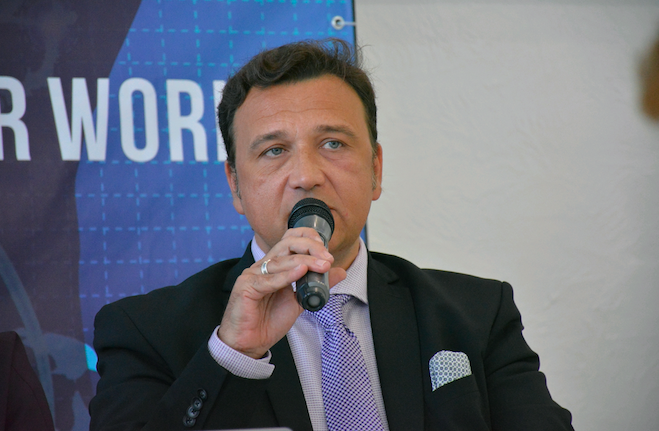Center for Geopolitical Studies expert and human rights lawyer currently based in Damascus Arnaud Devaley shares his analysis of Erdogan’s recent moves at the Syrian front.
“The Sultan is back to his old tricks,” he says. “Facing an uncertain presidential election in what was once touted as the pinnacle event of his legacy as uncontested leader of the Turkish republic, Ergogan’s path to reelection is fraught with obstacles. The economic miracle of the first 20 years of his tenure is but a fading memory. Inflation has soared to 73% while the Turkish Lira has significantly depreciated in a context which has seen him directly get involved in replacing economic experts over dissent bearing which policy to adopt as relates to the interest rate. In other words, the Sultan owns it all.
Having relinquished control of major cities to the opposition in recent years, Erdogan hopes to stem the tide of discontent by registering wins in foreign policy. One of his latest moves is the culmination of a series of forays in northern Syria by Turkish armed forces (2016’s Euphrates Shield, 2018’s Olive Branch, 2019’s Peace Spring and 2020’s Spring Shield). While the first three allowed Turkey to establish outposts and seize significant control of many key areas deep into Syrian territory and throughout the nearly 900 km long border area it shares with Syria, the last move was viewed as a setback which saw Turkey having to concede control of the crucial M4 highway to the Syrian Arab Army as a result of a memorable diplomatic dressdown in Moscow.
Prompt to take a leaf out of Washington’s playbook, Ankara justified his military interventions (and violations of Syrian sovereignty) in the name of the fight against terrorism. Erdogan’s long standing beef with the Kurds to be sure never stopped him from entering into a somewhat cozy relationship with the notorious Barzani clan in charge of Iraqi Kurdistan. This rapprochement has been very beneficial to both parties. American syphoning off of Syrian oil in the northeast of the country makes its way into one Iraq where it undergoes refining carried out by one member of the Barzani clan before being shipped out into Turkey where it is then exported out to Europe and Israel under the watchful eye of Erdogan’s own son.
In Syria, Erdogan has essentially endeavored to forcibly remove all Kurdish presence from areas under Turkish control. This has led to constant clashes with the Syrian Democratic Forces and its affiliates while the „international community“ has remained silent in the face of what amounts to ethnic cleansing which as everyone knows is a war crime.
Last week, Erdogan made his final move when he gave a speech to his AKP party during which he proclaimed that operations would be under way to secure the return of 1.5 million Syrian refugees into the areas in and around IDLIB. The Sultan has long had to face increasing complaints at home about the financial burden on the economy that is associated with tending to the most basic needs of the estimated 4 millions Syrian refugees living in Turkey. This financial burden while by no means the central cause of Ankara’s economic woes is seen by the Sultan as a wedge issue in the coming presidential campaign and he intends to instrumentalize it in order to secure reelection.
Erdogan calculates that he could come out on top if the 2023 centenial anniversary of the Young Turk’s Revolution sees him succeed in expanding Turkey’s sphere of influence by de facto annexing significant swathes of Syrian territories through the resettlement of refugees who would in turn depend on ANKARA for the financing of social services there. As of this writing, it has been announced that Turkey has financed the construction of nearly 150 000 prefabricated housing units in the areas it controls in northern Syria.
This project is however likely to meet its own demise before it is even implemented. Damascus has perfectly understood the ramifications of Ankara’s powerplay and has massed troops to confront the Turkish army in Manbij and Tell Rifaat as Ankara aims to retake control of the strategic M4 highway. (The M4 connects the south of Aleppo with the rest of the country).
Moscow for its part is aware that in the event the resettlement project is carried out, its own positions on the Syrian coast will be suddenly very vulnerable. Lattakia and Tartous are but a stonethrow away from Idlib’s missile-systems and the perspective of seeing this governerate become a reservoir of recruitment for NATO-member Turkey’s trope of using proxies has not escaped Moscow’s attention.
In order to send an extremely clear and unambiguous message to Ankara, the Russian Aerospatial Forces initiated last week a simulation of of a massive bombing campaign using the coordinates of Turkish troops in the area under scrutiny. At the same time, Turkey’s actions in Syria haven’t cause any escalation in the relations with the NATO, US, and EU, and no counter-actions similar to the ones targeted at Russia due to the military activities in Ukraine.
Erdogan wants to use what he perceives as leverage Turkey’s veto power to the admission on Sweden and Finland into NATO so as to extract concessions from Moscow in Syria. Moscow however increasingly sees the two theaters of Ukraine and Syria as but two components of the same equation. As the Minister of Foriegn Affairs of Russia Serguei Lavrov recently put it: „The West has declared total war on us.“
June 15, 2022

